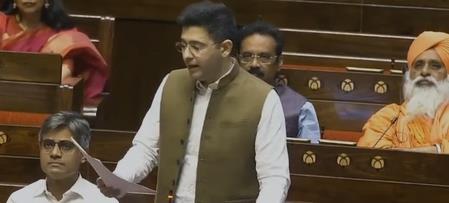
Raghav Chadha Calls For Judicial Reforms To Strengthen Public Trust
In his address in the Rajya Sabha, Chadha emphasised that the people of India regard the judiciary as a "temple of justice," trusting that it will uphold fairness and deliver justice.
He stated, "Just as divine justice may be delayed but never denied, the same belief applies to our judiciary -- justice may take time, but injustice must not prevail."
While acknowledging that the judiciary has historically fostered public trust, he cautioned that recent events have raised concerns that necessitate urgent reforms.
Chadha argued that just as reforms have improved elections, policing, education, and healthcare, similar advancements are essential in the judiciary. "Reforms should aim to strengthen the judiciary, not weaken it," he asserted.
Chadha highlighted longstanding criticisms of the collegium system, noting that multiple Law Commission reports and legal experts have flagged its opacity. He recalled the earlier push for the National Judicial Appointments Commission (NJAC) and stressed the need for self-reform within the collegium system.
"The collegium system has been criticised for its lack of transparency and public oversight. To address these shortcomings, an independent and transparent selection process should be established, ensuring that judicial appointments are based on seniority, merit, and integrity," he stated.
He proposed adopting a structured, point-based evaluation for judicial appointments, akin to the system used to designate senior advocates. The Supreme Court introduced a structured assessment for senior advocate appointments, assigning points for years of practice, pro bono work, and reported judgments.
Chadha suggested that a similar transparent, merit-based system for judicial appointments would enhance public confidence.
Chadha also expressed concern over the appointment of retired judges to administrative or executive roles within the government. He argued that such appointments create conflicts of interest, allowing executive influence over judicial decisions and undermining judicial independence.
Citing Article 148 of the Constitution, which prohibits the Comptroller and Auditor General (CAG) from accepting government positions post-retirement, Chadha proposed a similar restriction for judges. If a complete ban is not feasible, he suggested enforcing a mandatory two-year cooling-off period before retired judges can accept government appointments.
Chadha concluded by asserting that these reforms would mark a historic milestone in India's judicial system. "The people of this country view courts as temples of justice and judges as embodiments of fairness. Implementing these reforms will further deepen public trust in the judiciary," he said.

Legal Disclaimer:
MENAFN provides the
information “as is” without warranty of any kind. We do not accept
any responsibility or liability for the accuracy, content, images,
videos, licenses, completeness, legality, or reliability of the information
contained in this article. If you have any complaints or copyright
issues related to this article, kindly contact the provider above.


















Comments
No comment